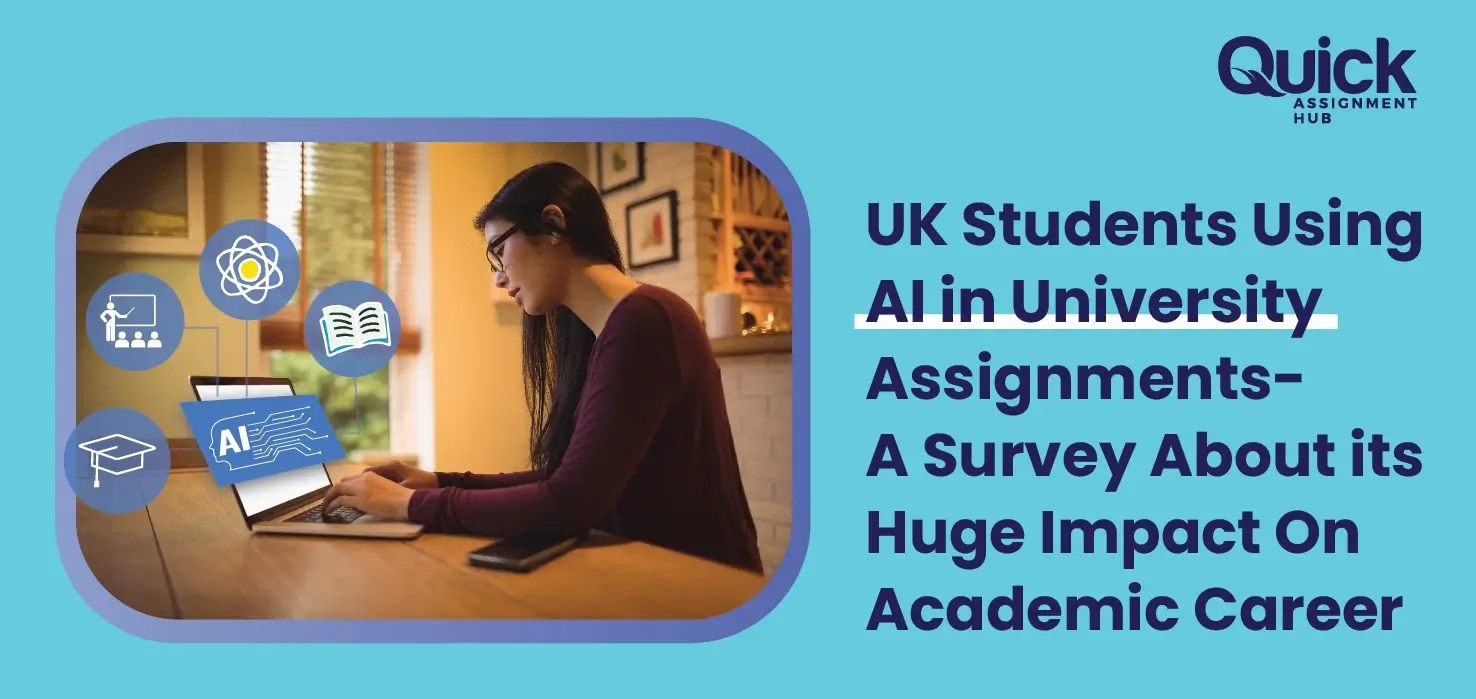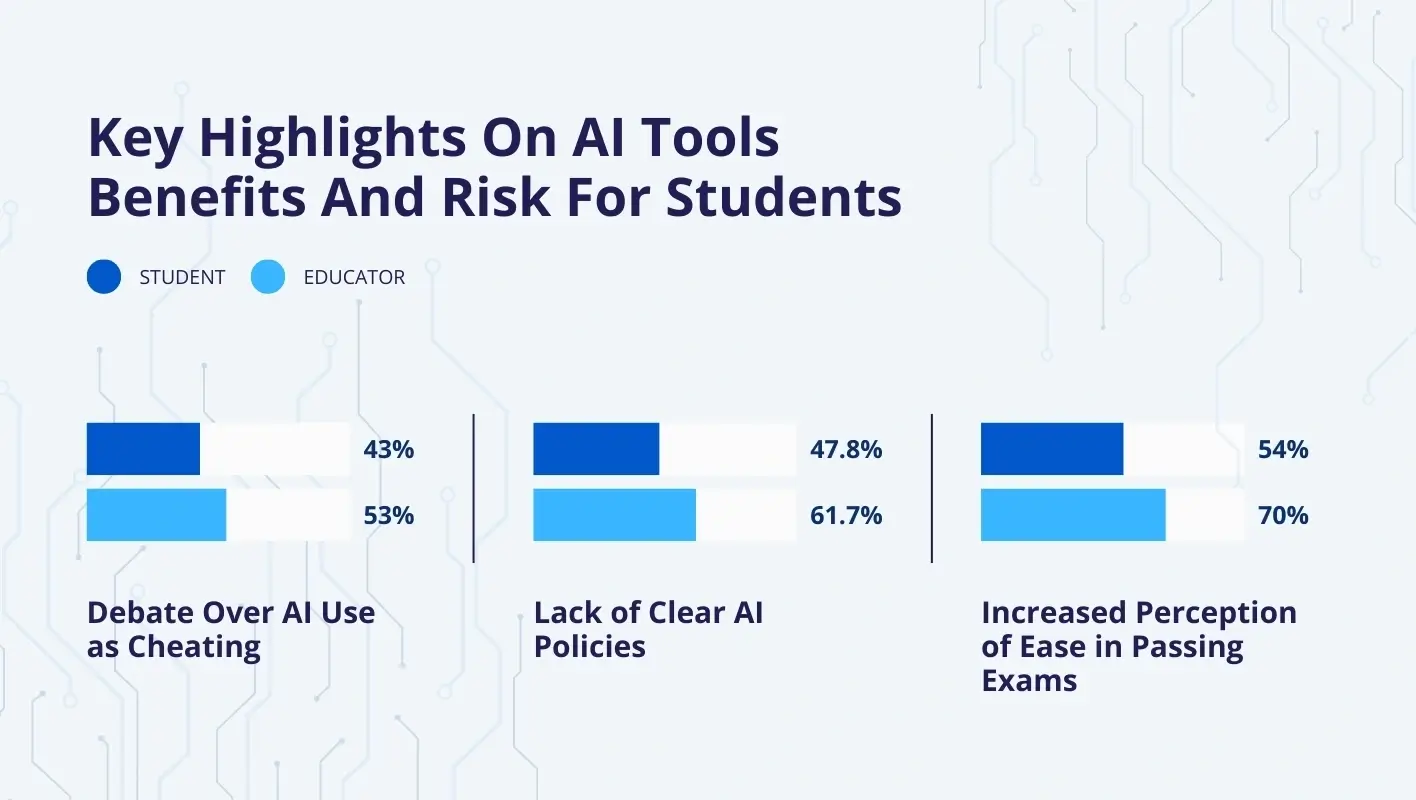
AI has emerged as one of the most innovative technologies in recent years in various industries, including the education system. Whether automating undesired work or improving learning processes, AI's use in academic settings is steadily growing. Many university students use AI to write assignments and essays and for exam preparations.
What are the effects of AI on their achievements as students, and what are the concerns and controversies associated with AI? These are the questions answered in this article, which explores the recent surveys and studies among UK students using AI and the involvement of the academic revolution through academics.
AI has brought changes in academic scenarios, threatening students and educators and providing them equal opportunities. Its influence can be seen in several key areas:
Personalised Learning: Intelligence-based tools allow for custom courses taught themselves, as the skills and rate of the student's student's learning process differ.
Research Efficiency: AI enhances and speeds up data gathering and thorough literature research.
Skill Development: AI supports students in developing skills that will enhance their competitiveness in future careers.
Administrative Automation: Basic classroom activities such as grading and scheduling are simplified to give educators more time.
Ethical Challenges: The increased utilisation of AI raises questions about plagiarism, data privacy, and the general integrity of the work.
Job Market Dynamics: AI revives career possibilities, highlighting the importance of critical thinking and flexibility in learning processes.
The latest research reveals that students are primarily leveraging AI tools to:
Conduct Research: AI assists students in searching for information within a short period and saves a lot of time through research.
Prepare for Exams: Using AI in revision, the students can capture their study's most critical areas and sequences.
Draft Assignments and Essays: Some AI tools help organise and write assignments, and others help learners correct grammar and enhance their writing.
AI's capability to help students with homework has made it a near-indispensable component of education. Students use various AI tools, including ChatGPT, Grammarly, and Microsoft Copilot for grammar checks. Such tools help in summarisation, and creating the first outline.
Yet, a minority of students (5%) confirmed that they sometimes submit texts written with AI's help without further revision, pointing to a shared ethical concern among students or graduates. Lack of knowledge can be why fewer students use AI tools. Another reason that seems more compelling is the ethical dilemma students face.
Your First Order
Get 20% OFF!
As AI technology enrols in learning institutions, issues of integrity in learning and the ethical use of AI in assignments are becoming issues of contestation. The advancement of AI tools has been speedy, and it has benefits and risks for students. Here are some key insights from recent research:

Increased Perception of Ease in Passing Exams: AI has made passing exams easier; 54% of students and 70% of educators support this thought. This convenience has sparked debates on whether AI hampers conventional learning techniques and encourages cheating.
Debate Over AI Use as Cheating: 43% of students share this opinion, while 53% of educators think using AI to accomplish university assignments is a form of academic misconduct. This view sums up the controversy of whether technology is indispensable assistance or mere evil exploitation.
Risk of Undisclosed AI Work: According to the survey, about 8% of students say they used AI work without reporting it. This practice contributes to issues related to maintaining academic integrity and complicates separating human work from AI.
Potential for AI to undermine Degree Credibility: Three-quarters of the students surveyed said improper regulation of AI might lead to devaluing university degrees. This concern calls for standard guidelines on using AI to ensure that the value of higher learning credentials is upheld.
Due to further progress in the development of AI technology and its increasing availability, universities must establish policies and activities that help organise the proper application of AI while ensuring academic integrity.
Here's why professional writing services are still better for assignments:
Customisation to Assignment Needs: The ability to write according to specific instructions, specific modes of writing, and specific styles, which AI cannot provide.
Ethical and Original Content: Experts maintain distinctiveness because AI is prone to repeating phrases or using words from the text, which is unethical.
In-depth Research and Analysis: AI writers do not assess specialised or current data as well as professional writers do due to professional writers' licensing and experience in research.
Enhanced Quality Control: Writers and editors are responsible for checking the work to ensure that the information provided is accurate, relevant, and arranged logically, which may not be possible when using AI alone.
AI is transforming education by providing innovative solutions that address learning needs and academic assistance. For UK students using AI in assignments, the technology offers efficiency in their work, feedback, and new ways of learning. Here's how AI is transforming education:
Personalised Learning Experiences: Online learning platforms supported by AI provide learning needs analysis. Students progress independently and at appropriate rates to master complex knowledge.
Efficient Assignment Assistance: Useful technologies include grammatical checkers, citation makers, and research aides, which make the task much easier and faster, thus easing the stress and increasing the student's self-esteem.
Instant Feedback for Continuous Improvement: AI offers real-time feedback that enables students to learn from their mistakes and correct them as they progress, making learning a continuous process.
Applying AI in university assignments can transform how students engage in their academic tasks. Despite the numerous advantages and access to large amounts of information, it has its ethical implications. Students must learn how AI's benefits affect quality-minded goals such as originality, fairness, and academic integrity.
If you are experiencing difficulty juggling your studies or need assistance completing your assignments, Quick Assignment Hub provides professional help with assignment writing.
When assigning your assignments to professional writers, you can be confident that you will get excellent assignments written according to established academic guidelines. Quick Assignment Hub is always here for you. Contact us today so that you can guarantee yourself success in your grades.
© Copyright Quick Assignment Hub All rights reserved.